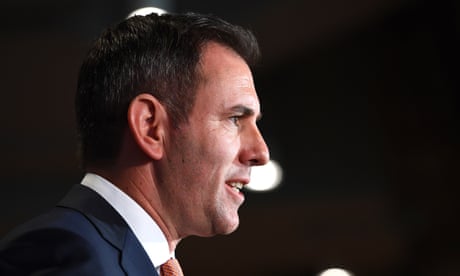- by foxnews
- 23 May 2025
Labor promises to ‘grab this opportunity’ to become renewable energy superpower
Labor promises to ‘grab this opportunity’ to become renewable energy superpower
- by theguardian
- 22 Apr 2023
- in news

The Albanese government has promised to "grab this opportunity" to become a renewable energy superpower after holding a high-level roundtable with major banks, financiers and investment managers.
The Friday roundtable in Brisbane comes after the treasurer, Jim Chalmers, said on Monday that next month's federal budget would see major investments in "cleaner and cheaper" energy.
Chalmers joined more than 30 figures from clean energy and climate, including representatives of investors and superannuation funds with more than $2tn under management.
But investors at the Brisbane roundtable warned the US government's multi-billion dollar package to attract and build clean energy projects risked making it harder to attract finance for projects in Australia.
The Biden administration's Inflation Reduction Act is creating a huge clean energy momentum that will drive down costs, but Australia will need to act quickly to take advantage of the shift, investors said.
Chalmers said: "the most important part of our strategy to grow the Australian economy is grabbing these opportunities for cleaner and cheaper energy.
"The government and the investment community understand that our prospects in this defining decade will be determined by how we manage and maximise this clean energy transformation."
He again signalled a theme of next month's budget would be clean energy and investments in industry "so Australia can be one of the biggest beneficiaries of the net zero transformation and not the victim of that transformation".
Investors and clean energy groups welcomed the roundtable - which included the climate and energy minister, Chris Bowen - saying it signalled the government's intent to put a clean energy transition at the front of its economic agenda.
After the roundtable, the government said it would create a "sovereign green bonds" program to be rolled out mid-2024 to raise finance for public projects that support Australia's net zero transformation.
Bonds give investors regular interest payments with a promise to return the principal at the end of a fixed term.
The government would also co-fund a development phase of an "Australian Sustainable Finance Taxonomy" - a project to help investors more easily target their funds towards particular kinds of sustainability projects.
The government also announced it would expand and upgrade a national energy rating scheme for existing homes "which means people will be able to seek a star rating of their home's energy performance", a statement said.
An extra $4.3m would go to corporate watchdog Asic to allow it to expand "surveillance and enforcement functions" on businesses making green claims.
Concerns were raised during the roundtable that the Biden administration's Inflation Reduction Act - a US$369bn package of climate measures and incentives passed last year - was making it harder to attract capital to Australia.
Anna Freeman, policy director at the Clean Energy Council who attended the roundtable, said: "The IR Act means we are facing some real risks and challenges that we will need to respond to, and the government is alert to that."
Freeman said the roundtable came against a backdrop of rising costs for clean energy projects related to post-Covid supply chain bumps, inflation and the knock-on effects of rising energy costs.
But she said there was "a very strong message" the government was "focused on putting the clean energy transition at the centre" of its economic agenda.
Simon Corbell, chief executive of the Clean Energy Investor Group, said: "it was a very clear message that the IR Act is having an enormous impact on investment decisions globally.
"The challenge for Australia," he said, was to "make sure it's got the right policy settings in place so we can benefit from the very significant decreases in technology costs that the IR Act will drive."
Rebecca Mikula-Wright, chief executive of the Investor Group on Climate Change, said the IR Act "is both good for the planet and will drive down the costs for everyone else globally" but said Australia "can't and should not attempt to match the scale of clean subsidies emerging globally".
"Instead we can be a fast-follower, acting quickly to deploy our resources and make the most of the opportunities provided to us. This enables us to focus on our value add and competitive advantage onshore.
"For example leveraging our abundant renewable energy potential to manufacture green steel in Australia, further boosting industries and jobs."
John Grimes, chief executive of the Smart Energy Council, said: "so many of us have been trying to blow the horn for so long to say this is a massive opportunity for the economy.
"To see this at the heart of government planning is an overwhelming relief. When governments consult well, plan well and listen, we get better policy outcomes. It's clear they want to get it right."
- by foxnews
- descember 09, 2016
United Airlines flight returns to Hawaii after concerning message found on bathroom mirror; FBI investigating
United Airlines Flight 1169 to Los Angeles returned to Hawaii after a "potential security concern" aboard the plane. The FBI and police are investigating.
read more


